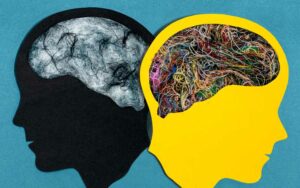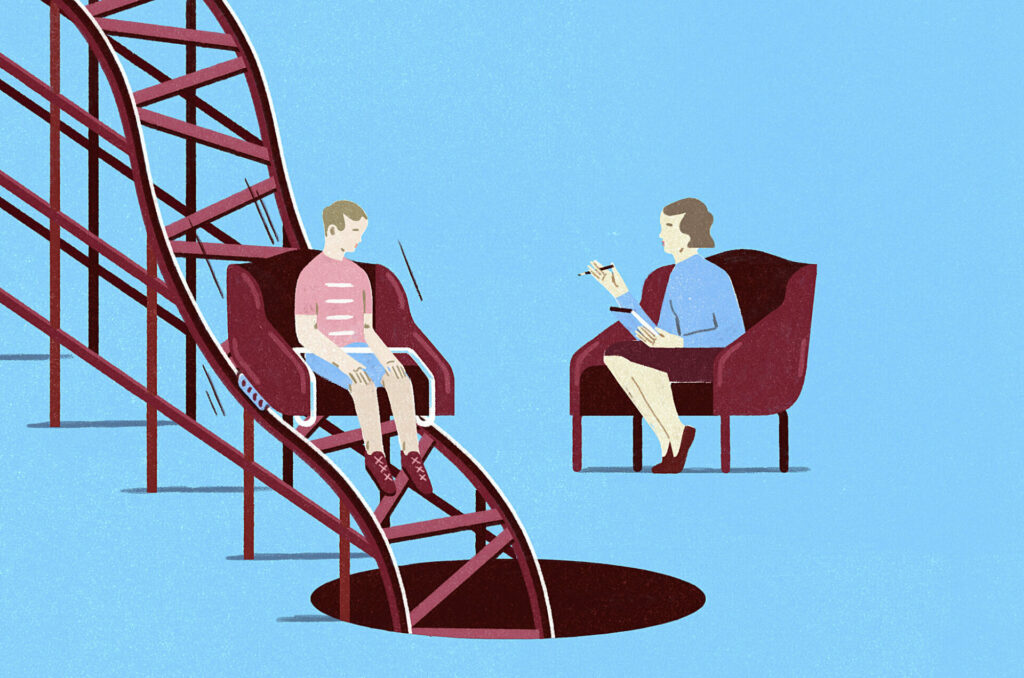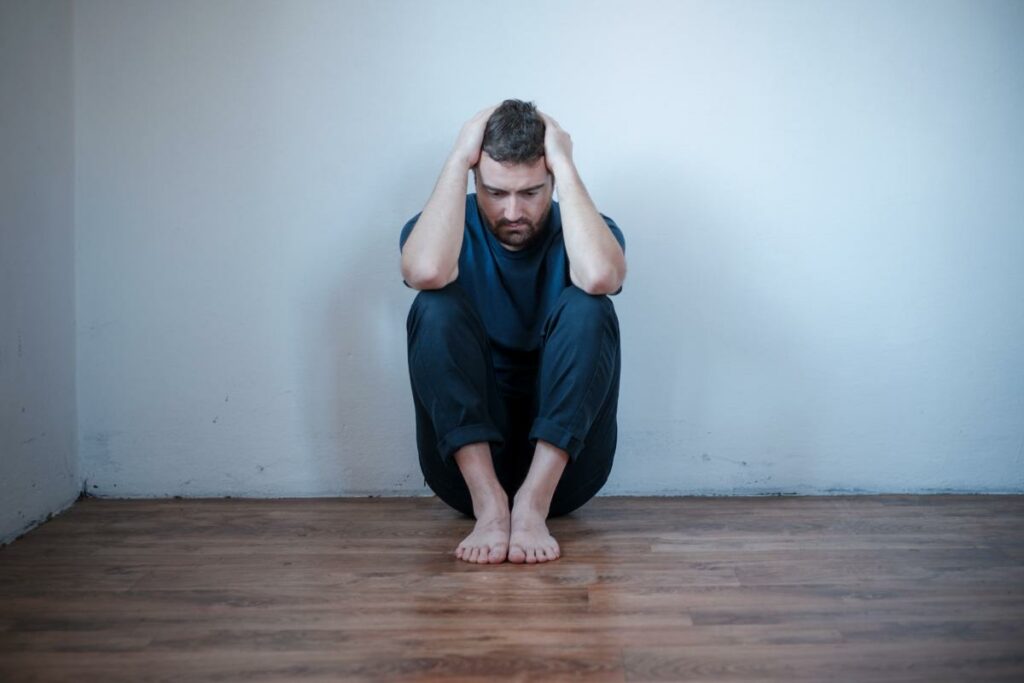Bipolar disorder is a mental illness that affects both men and women, but it often manifests differently in each gender. In men, bipolar symptoms can look very different from the symptoms seen in women. Both men and women need to be aware of the signs and symptoms of bipolar disorder so that they can get help if they need it. This blog post will discuss the symptoms of bipolar disorder in men, as well as how to get help if you or someone you know is affected by this condition.
Contents
- 1 Bipolar Disorder In Men
- 2 Is Bipolar Disorder In Men Different From Bipolar In Females?
- 3 What Are The Symptoms Of Bipolar Disorder In Men?
- 3.1 Feeling Overly Happy or “High”
- 3.2 Increased Energy Levels
- 3.3 Racing Thoughts
- 3.4 Unusual Risk-Taking Behaviour
- 3.5 Slowed Thinking or Speaking
- 3.6 Persistent Sadness or “Empty” Feeling
- 3.7 Loss of Interest in Activities You Once Enjoyed
- 3.8 Changes in Appetite or Weight
- 3.9 Irritability or Anger
- 3.10 Feelings of Guilt or Worthlessness
- 3.11 Loss of Energy or Motivation
- 3.12 Unexplained Physical Symptoms
- 3.13 Changes in Sleep Patterns
- 3.14 Suicidal Thoughts or Attempts
- 4 How To Manage Bipolar Disorder In Men?
- 5 Conclusion
Bipolar Disorder In Men

Bipolar disorder is a mental illness that causes extreme mood swings. The highs, called mania or hypomania, can last for days or even weeks. The lows, called depression, can last for weeks or months. Men with bipolar disorder may also have psychotic symptoms during their highs.
Sometimes, the symptoms of bipolar disorder in men can be mistaken for other conditions, such as ADHD or depression. It’s important to get an accurate diagnosis so you can get the best treatment.
If you think you might have bipolar disorder, talk to your doctor. He or she can do a complete evaluation and make a diagnosis.
Sometimes, bipolar disorder can be difficult to treat. But with the right treatment, you can manage your symptoms and live a healthy, happy life.
Is Bipolar Disorder In Men Different From Bipolar In Females?

Mainly, no. Bipolar disorder in men and women is very similar. However, there are a few key ways that bipolar disorder may present differently in men:
The difference can be found in how men and women experience symptoms of mania. Men tend to experience more psychotic symptoms during manic episodes. This means they may be more likely to act out in aggressive or risky ways. They may also have delusions or hallucinations.
During a depressive episode, men are more likely to turn to alcohol or drugs to cope with their feelings. This can make the depression worse and lead to addiction problems.
Because of these differences, men need to get an accurate diagnosis so they can get the best treatment possible.
What Are The Symptoms Of Bipolar Disorder In Men?

Bipolar disorder causes extreme mood swings. These can range from highs (mania or hypomania) to lows (depression).
Mania or hypomania symptoms can include:
Feeling Overly Happy or “High”
One of the most important bipolar disorder symptoms in men is feeling an abnormally high mood. This can make you feel extremely happy, energetic, and productive. You may also feel like you can’t sleep or like you don’t need to. Sometimes, mania can make you feel angry, irritable, or even violent.
During a hypomanic episode, you may not feel like your usual self, but you’re still able to function normally. A manic episode is more severe. It can make it hard for you to take care of yourself or do your job.
Increased Energy Levels
During a manic or hypomanic episode, you may have lots of energy and feel like you can’t sit still. You may also feel like you need less sleep than usual. These energy levels are different from the usual day-to-day fluctuations. They’re much higher and can last for days or weeks.
Racing Thoughts
When you’re in a manic or hypomanic state, your thoughts may race from one thing to the next. You may have trouble focusing on anything for a very long. This can make it hard to carry on a conversation or finish tasks. Also, your thoughts may be much more disorganized than usual. These racing thoughts are different from the worry or anxiety that people with anxiety disorders experience.
Unusual Risk-Taking Behaviour
During a manic episode, you may take part in risky behaviors that you wouldn’t normally do. This could include spending large amounts of money, engaging in unsafe sex, or driving recklessly. You may also feel like you can do anything and that nothing bad will happen to you. Sometimes, people in a manic state may also act out in violent or aggressive ways.
Slowed Thinking or Speaking
Sometimes, people with bipolar disorder may have trouble thinking clearly or speaking coherently. This can make it hard to carry on a conversation. Your thoughts may seem jumbled or disconnected. You may also have trouble concentrating or focusing on anything for a very long.
Persistent Sadness or “Empty” Feeling
One of the most common bipolar disorder symptoms in men is feeling persistently sad or “empty.” This sadness can last for weeks or longer. It’s different from the occasional feelings of sadness that everyone experiences from time to time. With bipolar disorder, the sadness can be so severe that it interferes with your ability to work, sleep, eat, and enjoy activities you used to enjoy.
Loss of Interest in Activities You Once Enjoyed
When you’re depressed, you may lose interest in activities that you once enjoyed. This can include hobbies, sex, and time with friends or family. You may also find it hard to concentrate on work or school. Sometimes, people with bipolar disorder may sleep too much or have very little energy. Other times, they may have trouble sleeping or be unable to sit still.
Changes in Appetite or Weight
Changes in appetite are common during both the manic and depressive phases of bipolar disorder. During a manic episode, you may go days without eating because you don’t feel hungry. This can lead to weight loss. During a depressive episode, you may eat more than usual and gain weight.
Irritability or Anger
Bipolar disorder can cause extreme mood swings, which can lead to irritability or anger. During a manic episode, you may be more likely to lash out at people for no reason. During a depressive episode, you may feel hopeless and helpless. These feelings can make you angry and irritable.
Feelings of Guilt or Worthlessness
During a depressive episode, you may feel like you’re not good enough or that you’ve done something wrong. These feelings of guilt and worthlessness can be overwhelming and can last for weeks or longer.
Loss of Energy or Motivation
One of the most common bipolar disorder symptoms in men is feeling fatigued or having a loss of energy. This can make it hard to get out of bed, go to work, or take care of your responsibilities. You may also have a hard time enjoying activities that you once enjoyed.
Unexplained Physical Symptoms
Sometimes, people with bipolar disorder may experience physical symptoms that don’t have a known cause. These can include headaches, stomachaches, and pain that doesn’t go away with over-the-counter medication. These also may be symptoms of other medical conditions, so it’s important to see your doctor if you’re experiencing any of these.
Changes in Sleep Patterns
Bipolar disorder can cause changes in your sleep patterns. During a manic episode, you may not feel like you need to sleep and may go days without sleeping. This can lead to exhaustion. During a depressive episode, you may sleep too much or have trouble sleeping. You may also have insomnia, which is when you have trouble falling asleep or staying asleep.
Suicidal Thoughts or Attempts
Suicidal thoughts may be one of the most serious bipolar disorder symptoms in men. If you’re having thoughts about harming yourself or taking your own life, it’s important to get help right away. Suicide is a real danger for people with bipolar disorder. Also, people with bipolar disorder are more likely to attempt suicide than people without the condition.
How To Manage Bipolar Disorder In Men?

Managing bipolar disorder in men can be tricky. Here are some tips on how to deal with the most common symptoms.
Trying to live with bipolar disorder can be incredibly difficult, especially if you’re not sure how to manage your symptoms. The most important thing you can do is to learn as much as you can about the condition and its effects on your body and mind. This knowledge will help you develop coping strategies and make informed choices about your treatment.
Some other tips that may help you manage your bipolar disorder include:
Identifying Your Triggers
The first important step in managing bipolar disorder is to identify your triggers. Triggers are anything – a person, place, thing, or situation – that can cause you to experience a manic or depressive episode. Once you know what your triggers are, you can take steps to avoid them or be prepared to deal with them if they do occur.
Sticking to a Treatment Plan
It’s also important to stick to your treatment plan. This may include taking medication as prescribed and attending therapy sessions. It’s important to note that treatment for bipolar disorder is not a one-time event; it’s something you’ll need to continue for the long term. Also, be sure to keep your doctor or mental health professional informed of any changes in your symptoms or how you’re feeling.
Exercising Regularly
An often-overlooked treatment for bipolar disorder is exercise. Exercise is an effective mood stabilizer and can help reduce the symptoms of both mania and depression. It can also help improve sleep, increase energy levels, and reduce stress. Aim for 30 minutes of moderate exercise most days of the week.
Eating a Healthy Diet
What you eat can also affect your mood. Eating a healthy diet that includes plenty of fruits, vegetables, whole grains, and lean protein can help stabilize your mood and give you the energy you need to manage your symptoms. Avoiding caffeine, alcohol, and sugary foods can also help as they can trigger or worsen symptoms.
Getting Enough Sleep
Another important factor in managing bipolar disorder is getting enough sleep. Most people need around eight hours of sleep each night, but people with bipolar disorder often need more. Getting enough sleep can help stabilize your mood and improve your energy levels.
Managing Stress
Stress can trigger or worsen bipolar symptoms, so it’s important to find ways to manage it. Some stress-reducing techniques that may help include relaxation exercises, yoga, meditation, and deep breathing.
Building a Support System
Last but not least, it’s important to build a support system of family and friends who can offer emotional and practical support. These people can provide much-needed understanding, encouragement, and assistance when you’re struggling with bipolar disorder. Sometimes, just knowing that someone cares can make all the difference.
Of course, every person experiences bipolar disorder differently, so it’s important to work with your doctor or mental health professional to develop a treatment plan that’s right for you. With the right support and treatment, you can manage your symptoms and live a full and productive life.
Conclusion
Bipolar symptoms in men can vary and be hard to spot. It’s important to know the signs and symptoms of bipolar disorder and to seek help from a mental health professional if you think you or a loved one may have bipolar disorder. With proper diagnosis and treatment, people with bipolar disorder can lead happy, fulfilling lives.
If you or someone you love is struggling with bipolar disorder, there is help available. Sometimes it can be difficult to know where to turn, but there are many resources available to help you find the support you need. The following organizations can provide you with information and support.
Hope this article was of help to you! If you are suffering from mental health disorders, you may seek help from Therapy Mantra. We have a team of highly trained and experienced therapists who can provide you with the tools and skills necessary for overcoming mental health disorders. Contact us today to schedule an online therapy or download our free Android or iOS app for more information.


